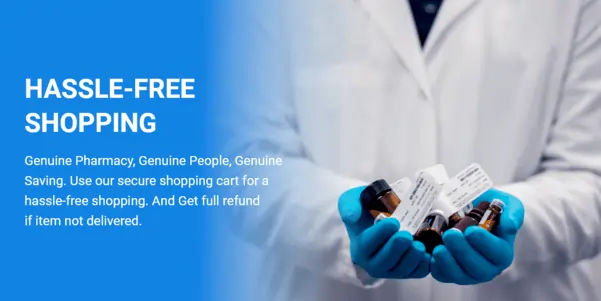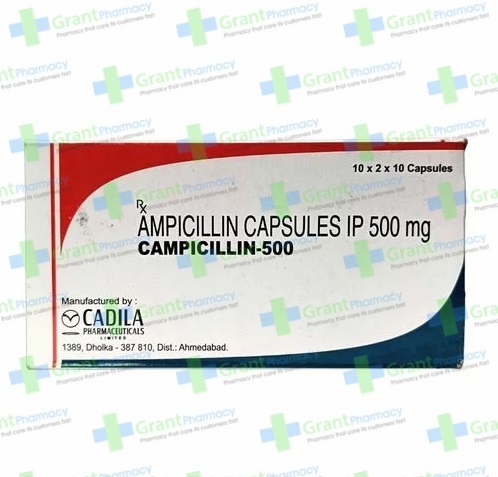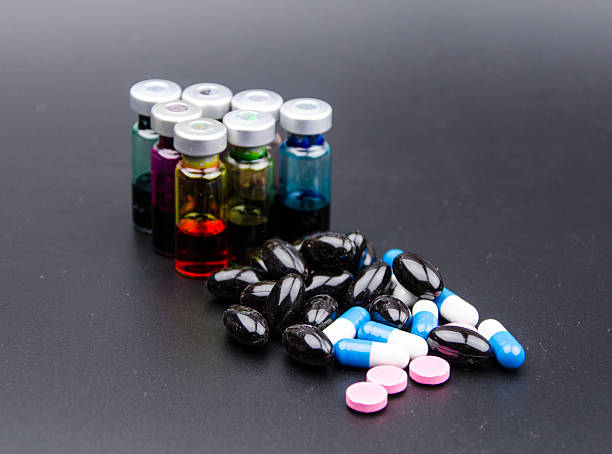






Ampicillin is a penicillin medication that is used to treat certain types of bacterial infection,upper nd lower respiratory infection, gastrointestinal infection. The drug was developed to get rid of drug resistance and prolong the antimicrobial attention of penicillins. It is an acid-resistant medicine thus it can be given orally.
Ampicillin is a prescription medicine that comes under the brand names Ampi, Principen, Penglobe, and Omnipen. Ampicillin is accessible in the form of an oral capsule, oral suspension, and intravenous drug. Oral capsule is used to treat certain infections that are caused by bacteria.
Capsules (250 mg and 500 mg)
Oral suspension (125 mg/5ml)
Powder for injection (125 mg, 250 mg, 500 mg, 1 g, 2 g and 10 g)
Ampicillin is generally prescribed to treat certain types of bacterial infections. The antibiotic drug is used to treat infections in the stomach and intestines, bladder, middle ear, sinuses, and kidney caused by susceptible bacteria. It can be prescribed to treat a urinary tract infection however not a first choice traetment option. Visit the Grant Pharmacy website and Order your Ampicillin medicine today.This medicine can be prescribed in combination with other medications.
Respiratory tract infections (caused by Staphylococcus aureus, H influenza, group A beta-hemolytic streptococci and S pneumonia)
Bacterial meningitis
Septicemia and infective endocarditis (caused by streptococci, Staphylococci, HACEK microorganisms0
Genitourinary infections (caused by sensitive strains of Proteus mirabilis and Escherichia coli)
Gastrointestinal infections 9caused by Salmonella typhi, Other Salmonella species and Shigella species)
Neonatal group B Streptococcal infection prophylaxis
Prophylaxis in surgery
Chorioamnionitis
Crabapenem-resistant Acinetobacter baumannii
Ampicillin acts by killing the infection-causing bacteria that stops the growth of infection. The mechanism of action on sensitive organisms comprises a two-step process. In the initial step the medicine muddles with primary receptors (membrane-bound penicillin-binding proteins). These proteins have a vital role in the cell cycle thus inactivation of penicillin-binding proteins (PBPs) immediately impacts their functions. Ampicillin: Get it from our Reputed Online Grant Pharmacy.
The second step comprises the physiological effects due to receptor-ligand interaction. PBPs are associated with the late stages of peptidoglycan synthesis in the cell wall. Peptidoglycan maintains the integrity of the cell wall that lives in a hypotonic environment, thus its interruption causes cell death.

This drug can be administered orally, intravenously, or intramuscularly. For moderately severe and severe infections parenteral administration is preferred. For life-threatening conditions, the oral route should not be prescribed as the initial therapy but can be followed after parenteral therapy.
Take this medicine on an empty stomach with 1-2 glasses of water to boost the absorption of the drug.
Ampicillin may be given intravenously as an IV bolus. Reconstitution of vials comprising 125mg, 250mg, or 500mg of the medicine with 5ml sterile water is advised. Vials comprising 1g or 2g should be reconstituted at 7.4 or 14.8 ml of sterile water or bacteriostatic.
For intramuscular administration, the injection should be given into a large muscle mass. Reconstitute with bacteriostatic or sterile water to make solutions containing 125 mg/ml or 250 mg/ml.
No dose adjustments are required in patients with hepatic impairment.
The dosing frequency needs to be adjusted depending on the CrCl of patients in patients with renal impairment.
The exact dosage, drug form, strength, and how often you need to take this drug are based on your age, the condition that needs to be treated, the severity of the condition, other health problems you have, medical history and how your body responds to this medicine.
For genitourinary tract infections, the typical dosage is 500 mg 4 times a day. For severe or chronic infections larger doses may be prescribed.
To treat gonorrhea, the typical dosage is 3.5 g once with 1 g of probenecid.
The genitourinary tract infection dosage for children weighing more than 20 kg is 500 mg 4 times a day.
The genitourinary tract infection dosage for children weighing less than 20 kg is 100 mg/kg per day in 4 equally divided and spaced doses.
The kidneys of senior people may not function as well as adults’s. It can make the body process drugs more slowly and rug remains in your body for an extended time. It can raise the risk of side effects. Your healthcare provider may begin with a lowered dose at a different schedule preventing too much build-up of drug in your body. Certain lab tests must be done before and during the treatment.
It is prescribed as 250 mg 4 times a day.
For children weighing more than 20 kg 250 mg 4 times a day
For children weighing less than 20 kg 50 mg/kg in equally divided doses and equal time intervals (4-5 times a day)
500 mg 4 times a day
For children weighing more than 20 kg 500 mg 4 times a day.
For children weighing less than 20 kg 100 mg/kg a day is divided into equal doses and even intervals.
Your healthcare professional will determine the correct dosage for you.
Ampicillin oral capsule is prescribed as a short-term treatment. Swallow the capsule with a sufficient amount of water. If you stop taking this medicine early without completing the prescribed course, your infection may come back and even become worse.
If you skip doses, this medicine may not be able to work as well as it should. To get the maximum of this drug it is essential to maintain a certain level of it in your body all the time. In case of a missed dose take it instantly as you remember. If it is time for the next dose, skip it and take the next dose. Do not take 2 doses at the same time.
Taking too much of this medicine can cause overdose symptoms such as diarrhea and upset stomach. In that case, you should call your healthcare provider or a poison control center for medical help. Ampicillin from Grant Pharmacy and get it delivered to your doorstep.

This medicine may cause allergic reactions in certain people. Symptoms of a severe allergic reaction are rash, trouble breathing, and swelling of the throat. Avoid taking Ampicillin if you ever had an allergic reaction to it or cephalosporin antibiotics.
This is a category B drug that is broadly prescribed to pregnant women. You can buy Ampicillin from Online Grant Pharmacy. It is advised that pregnant females with preterm premature rupture of membranes should be treated with intravenous ampicillin followed by oral doses to lessen neonatal complications.
Ampicillin can pass into the breast milk and cause side effects in nursing children. Talk to your doctor if you are breastfeeding your baby. You may need to stop breastfeeding while taking this medicine.
In diabetic patients, this medicine can cause a false positive while the healthcare professional tests you for glucose levels in urine. It means it can interfere with certain diabetic urine tests, as a result test report may indicate that you have glucose in your urine while you do not. Discuss the safety of this drug with your doctor.
If you have kidney disease or a history of kidney problems your body may not clear this medicine from the body properly. It may increase the drug level in your body and cause side effects.
For newborns and infants, the lowest possible dose should be given. Their kidneys are not completely developed and may take longer to remove the drug from the body.
This medicine may cause diarrhea. Contact your healthcare provider if you have watery or bloody diarrhea with or without stomach cramps after you stop taking Ampicillin. Do not take any anti diarrhea products until your doctor advise as these can make your symptoms worse.
Ampicillin oral antibiotic treatment may cause side effects in some patients. Mild side effects get better within a few days and include:
Nausea
Vomiting
Diarrhea
Sores of mouth or tongue
Serious side effects include;
Nausea or vomiting that lasts longer
Fever that doesn’t get better
Dark urine
Stomach pain
The yellowness of eyes and skin
Easy bruising
Bleeding
This medicine can rarely cause severe intestinal condition because of bacteria called C difficile. It may occur during the treatment or months after the traetment.
When drugs interact they alter how your medicine works against the infection. It can increase the risk of side effects and prevent the medicine from working suitably. Ampicillin may interact with other prescription or non-prescription medicines, vitamins, herbal supplements, or other products.
Your health provider needs to manage all other drugs you are taking to avoid possible drug interactions. Thus make sure your doctor is aware of all the medicines or any pharmacy products you're taking.
Probenecid:
Combining oral dosage form of Ampicillin and Probenecid can cause adverse effects such as nausea, diarrhea, and vomiting.
Allopurinol:
Combining Allopurinol with Ampicillin can increase the risk of an adverse reaction such as a skin rash.
Chloramphenicol, Sulfonamides, Tetracyclines, and Macrolides: Combining these medicines with Ampicillin influences how it works. Ampicillin may not work suitably to treat your condition because other antibiotics prevent the growth of bacteria that Ampicillin requires to kill them.
Oral Contraceptives:
If you take birth control pills while using Ampicillin, it may make them less effective. Your healthcare professional may prescribe you a different form of birth control during treatment.
Prolonged Use:
If you are using this medicine for prolonged or repeated periods you may develop oral thrush ora vagianl yeast infection. Consult your health care professional if you have white patches inside your mouth or you notice a change in vaginal discharge.
Ampicillin is an effective antibiotic medication that is used to treat and manage several bacterial infections. It acts by discontinuing the growth of infection-causing bacteria. It only treats bacterial infections and does not work against viral infections such as flu and the common cold. If you are taking this medicine for a long period, make sure you follow all medical and lab appointments such as complete blood count, liver and kidney function etc.
Generally the genera regarded to be susceptible to Ampicillin are Pasterurella, Proteus, Salmonella, Shigella, Klebsiella, Escherichia, Clostridium, Corynebacterium, Streptococcis and Straphylococcus even though some of these have acquired resistance to this drug.
The half life of Ampicillin in patients with normal renal function is 1-1.9 hour and it is increased in patients with impaired renal function.
Ampicillin carries a broad spectrum action and it is effective against infections caused by various sensitive strains or susceptible organisms. It is active with respect to gram negative bacteria and garm positive cocci, intestinal bacilli, listeria, enterococci and a few starins of hemophilic bacilli.
This drug is wella absorbed from gastrointestinal tract and attains peak concentrations in 1-2 hours. Food reduces the absorption of Ampicillin. The bioavailability of this medicine is around 63% for parenteral routes.
The antibacterial spectrum and activity level of both of these drugs is essentially same and there is a complete cross resistance between these medicines.



